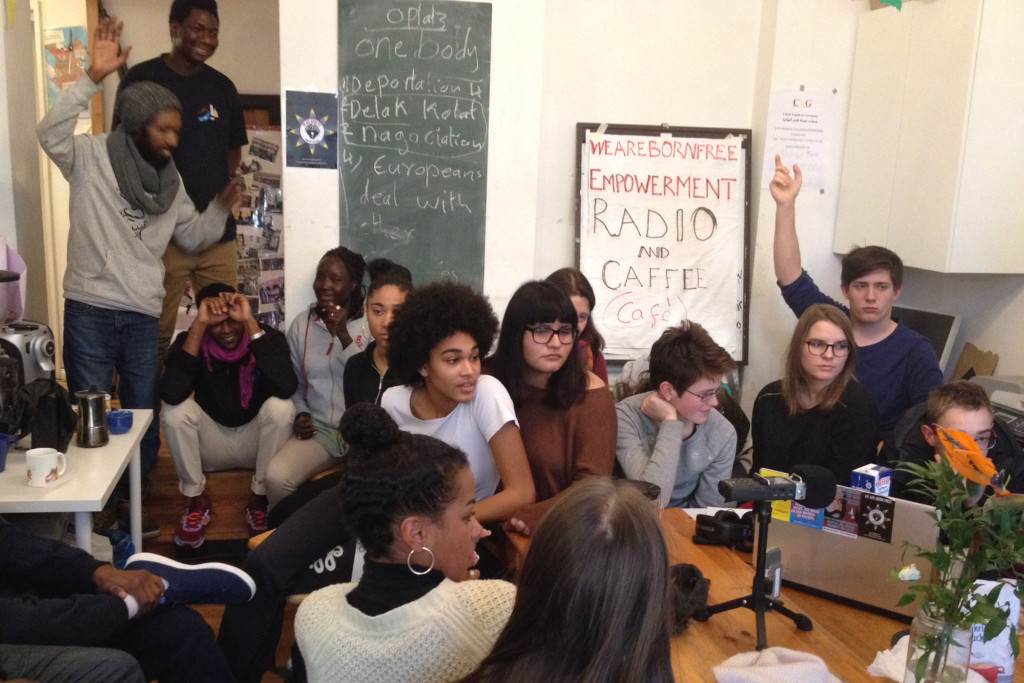Thinking about the future is always a case of thinking about it from somewhere and from a particular set of concerns. The defense industry might want to explore possible futures for weaponry, political stability, or religious tolerance, for example. The Environment Agency might be concerned with questions of variables in sea level, attitudes to environmental change, or the development of geoengineering. A commercial company may be concerned with questions of competitor products, materials costs, consumer demand, or new production processes. The questions that we ask of the future are acutely shaped by our perception of our sphere of activity, by our sense of what it is that we think we do.
Today’s dominant myth of the future of education emerges out of an instrumental conception of education as primarily concerned with serving the formal economy. It asks: what sort of competition will our businesses be up against in future? What sorts of skill will our workers need for the workplace? How can we ensure competitive advantage for the nation in the context of socio-technical change?
A different conception of education, however, requires us to ask different questions of the implications of socio-technical change for education’s futures.
For example, we can conceive of education’s purpose as being broader than simply serving the formal economy. We can acknowledge education’s role in creating citizens and social beings who will live in and act upon the world beyond the workplace as parents, as neighbors, as members of civil society. We can acknowledge education’s role in nurturing and developing the individual, in supporting them to understand, know, and become themselves. We can acknowledge education’s role in caring for children and in acting as a foundation for the intergenerational contract. We can acknowledge education’s role in apprenticing novices into the rich histories of knowledge, culture, and craft that humanity has developed over centuries and that we seek to pass down the generations. We can also acknowledge education’s role in building the economic and environmental sustainability of the communities it serves.
Any educator thinking about how education might need to adapt to future change, therefore, can’t simply see the future workplace as a proxy for “the future.” Instead, they will need to ask whether socio-technical developments might offer new resources or contexts for us as citizens, as children, as workers, as parents, and as learners over the coming years.
Above all, if we see education as having a role in mitigating inequalities and in contributing to the creation of fairer and democratic futures, we have a responsibility to ask whether socio-technical developments will contribute to or impede that role. We need to ask, “who benefits?” in any of the visions of the future we are offered or that we are working towards. And we need to examine where educational institutions might productively play a role in helping to ensure that the least advantaged communities are equipped with a fair chance to shape socio-technical developments in ways that will not see them even further disadvantaged.
At this point, it is also worth noting that the relationship between education and the future can be turned on its head. We should also conceive of education as a primary motor for shaping social values, ideas, beliefs, and capabilities rather than as a servant of society, laggardly following on behind wherever socio-technical change might lead. Indeed, as the researcher David Baker has recently argued:
“Schooling, as it has been practised over the past 150 years, is far more than a preparatory exercise for youth, merely following where the technological and social demands of society take it. Rather, the educational revolution has constructed, for better or worse, most of the dominant ideas, beliefs, and human capabilities that underpin human society as we know it at the beginning of the twenty-first century. This is how best to think about formal education and its possible future impact on society.”
With such a recognition of agency comes responsibility, an acknowledgement that the futures we come to inhabit will be ones that educators, along with others, create. With such a recognition comes the question – who benefits from the futures we are imagining and building in education?
Our concern as educators when we inquire into the future, then, should not simply be one of preparing ourselves for an inevitable future and attempting to “future-proof” our systems. Instead, we should see the relationship between the future and education as a reciprocal dialog of anticipation, adaptation, and creation. We may need to adapt to change on a short timescale, but over the longer term education can also be a motor for radical transformation of social values, practices, and ideas. This requires both agility and ambition, responsiveness and imagination.
We can rewrite the relationship between education and socio-technical change. We can reclaim the right of schools to act as resources for their communities to imagine and build the futures that they want rather than simply training them for the futures they have been given. To do so, we need to remember that the future is not set in stone, that technology is not some magical force driving us down one inevitable path, and that education is also a force to be reckoned with when it comes to shaping progressive futures.
